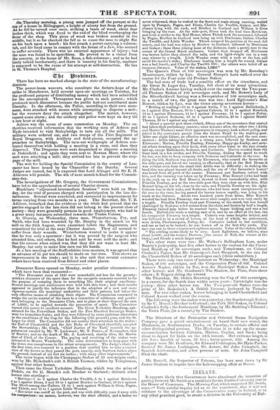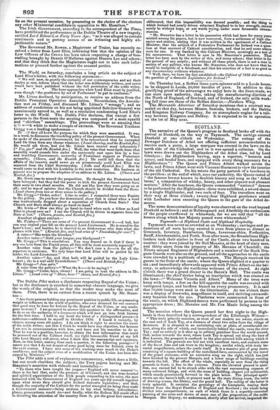IRELAND.
It appears likely that Government have abandoned the intention of putting forward Mr. Smith as a candidate for the Dublin University seat in the House of Commons. The Morning Post, which supported Mr. Smith, says—" Very careful inquiry led us to the conclusion, that it will not conduce to the advantage of the Conservative cause in Ireland, or to any other practical good, to create a division in the University of Dab-
lin on the present occasion, by presenting to the choice of the electors any other Ministerial candidate in opposition to Mr. Hamilton." The Irish Government, according to the correspondent of the Times, have prohibited the performance at the Dublin Theatre of a new tragedy, entitled Lord Edward, or Forty Years Ago ; "as it was alleged to contain sentiments and to portray scenes of an irritating and highly ob- jectionable nature."
The Reverend Mr. Rowan, a Magistrate of Tralee, has recently re- ceived a letter from Lord Eliot, informing him that the opinion of the Law Officers of the Crown has been taken respecting a charge of fore- stalling brought by Dennis O'Flalloran against Honora Lee and others ; and that they think that the Magistrates ought not to take such infor- mations or proceed further against the accused parties.
The World, on Saturday, concludes a long article on the subject of Lord Eliot's letter, with the following statement-
" We will now, to gratify the curiosity of our contemporaries and set their doubts at rest, inform them that the letter was deliberately written, and never would have been published without the full permission of the noble writer.
* • • • The hour approaches when Lord Eliot must be justified, even though 'the gentlemen by act of Parliament' be put to confusion."
Mr. Litton declined, by anticipation, to receive an address from the Dublin Protestant Operative Association. Nevertheless, the Associa- tion met on Friday, and discussed Mr. Litton's "wrongs"; and an address of condolence on his not being appointed Solicitor-General was unanimously agreed to, as well as a resolution condemning Lord Eliot's letter to the World. The Dublin Pilot declares, that except a few persons in the front-seats the meeting was composed of a most squalid and " shirtless " assemblage. The proceedings were so amusing that it wo,.th while to make a couple of extracts. The Reverend 'Eresham Gregg was a leading spokesman.-
lic
.14 they all knew the purpose for which they were assembled. It was, in a word, to denounce the truckling policy of the present Government. When he spoke of the present Government, let it be remembered that he exempted Lord De Grey from any charge whatever. (Loud cheering, and the Kentish fire.) Ile would ask them, had not Mr. Litton been treated most infamously ? (" Yes, yes!" and Me Kentish fire.) Well, the voice that went forth from that assembly would console him under the contumely cast upon him by a base and truckling Government, unworthy of Protestant support or Protestant sympathy. (Cheers, and the Kentish fire.) He could tell them that the affairs of the country could never go on prosperously until Lord Eliot was removed from the Chief Secretaryship. (Yells and Kentish fire.) But he would come to deal with his Lordship in the next resolution. his business at present was to propose the adoption of an address to Mr. Litton. (Cheers and Kentish fire.)
Mr. Irwin rose to second the proposition. He thought the Protestants had been betrayed; but they had the power to kick the present Government from their seats in two short months. He did not like how they were going on at all; and be was of opinion that the Church should be divided from the State. (Loud cheers from two or three voices in the gallery.)
Mr. Gregg—" Order, order ! I rise to order: I suspected there were Papists in the gallery. Do you hear the demoniacal cheer that is raised when a word was inadvertently dropped about a separation of Church from State? Our Church and State shall always go hand-in-hand."
Mr. Irwin—. How can they go hand-in-hand when such a fellow as Lord Eliot is placed over us ? I say the Church will be driven to separate from the State at last." (Cheers, groans, and Kentish fire.)
Another elegant extract—
Mr. Paisley—" There are some of the present Government d—d bad, but you may depend your life on the present Lord-Lieutenant. He is sound to the heart's core; and besides, he is married to an Irishwoman who does what she pleases with him." (Kentish fire, and loud cries of " Enniskiden for ever!")
A voice—"She wears the breeches."
Another voice—" Hold your tongue, you blackguard ! "
Mr. Gregg—. This is scandalous. You may depend on it that if there is any one here from the Popish press, all this will be most accurately reported."
Another voice from the gallery—" We don't care a d—n for all the reporters in existence. We only hope that Lord Eliot will be guided by his leader, the Lord-Lieutenant."
Another voice—" Ay, and that both will be guided by the Lady Lieu- tenant ; she is a real mild Enniskillener." (Cheers and Kentish fire.) Mr. Gregg—" Jam satis."
A voice from the gallery—" 'What the h—is he saying ? "
Mr. Gregg—" Come, boys, silence! I am going to read the address to Mr. Litton." (Loud cries of "Hear, hear !" cheers, and Kentish fire.)
The Dublin Pilot makes a disclosure respecting Repeal of the Union ; but as the disclosure is couched in somewhat obscure language, we give the words of the original, so that the reader may make the most of them. First, there is an extract from a recent speech by Mr. Staun- ton— " Are there persons holding any prominent position in public life, or possessing weight or influence in the world of politics, who ever dreamed for one moment that good may be done for Ireland by the Repeal of the Union, or any analo- gous measure ? I am prepared to answer this question in the affirmative, and to do so on the authority of a document which will now go into Irish history for the first time. I hold in my band the letter of a distinguished person—a nobleman—addressed to myself in October 1830. I found it recently, by chance, among some old papers. I do not think it right to mention the name of the noble writer; not that I think be would have any objection, but because I am not in communication with him, and have not his sanction to do so. That he was in a position, however, to obtain the best information that could be procured out of the Cabinet itself, my right honourable friend at my left (the Lord Mayor) will attest, when I show him the manuscript and signature. Now, in this letter, coming from such a quarter, is the following passage—' I assure you that I do not despair of some good being done for Ireland, even in the next session. I have met some of the working-men much in the Duke's confidence, and the subject even of a modification of the Union has been dis- cussed by Ministers.' "
The Pilot adds a sort of explanatory commentary, which does a little, but not much elucidate the subject ; the Tory papers having met Mr. Staunton's assertion with ridicule and incredulity-
" To those who have caught the jargon= England will never consent '— there is the fact that, under the pressure of O'Connell, and the true-hearted and spirited organization of the Irish people responding to his voice, the men intrusted with the Government of England ten years ago did consult together upon what terms they should give Ireland domestic legislation ; and that, though the majority of the Cabinet for the period strangled its being then made a Government measure—being anxious to try what bribery, intimidation, places, prosecutions, would do—and finally, what the Reform Bill could effect in diverting the attention of the country from it, yet the great fact cannot be obliterated, that this impossibility was deemed possible; and the thing to which Ireland had nearly driven reluctant England to in her strength, cannot surely be without hope, or not worth trying, under more favourable circum- stances.
"Mr. Staunton has a letter in his possession which had been for many years mislaid among his papers, but is now recovered, from a nobleman of high cha- racter and station, stating that it was written in the apartment of a Cabinet Minister, that the subject of a Federative Parliament for Ireland was a ques- tion at that moment of Cabinet consideration, and that he and some others were for one. It was franked by this Cabinet Minister, seemingly as a test of
i
his concurrence. That letter s now in Mr. Staunton's possesaion. That letter has been seen by the writer of this, and many others; that letter is for the perusal of any sceptic ; and without all these proofs, there is not a man in society of any politics, who knows Mr. Staunton, who does not know that he would be incapable of a falsehood, and that his assertion of a fact is as good as any documentary evidence whatever.
" Well, then, we have the fact established—the Cabinet of 1832 did entertain the question of a domestic Legislature for Ireland ! "
On Thursday last, a Belfast linen-yarn-spinner sold to a Leeds house, to be shipped to Leeds, 20,000 bundles of yarn. In addition to this gratifying proof of the advantages we enjoy here in the linen-trade, we can state upon authority, that, taking the manufacturing-districts of the North of England, of Scotland, and of Ireland, the only mills work- ing full time are those of the Belfast district.—Northern Whig.
The Mercantile Advertiser of Saturday mentions that a contract was sealed on that day, between Messrs. Samuda, brokers, and the Dublin and Kingston Railway Company, for an atmospheric engine for a rail- way between Kingston and Dalkey. It is expected to be in operation on the 1st of May next.



























 Previous page
Previous page